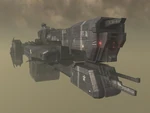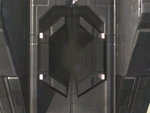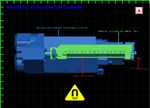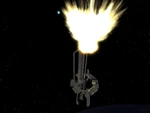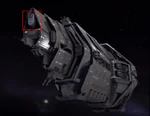| This article does not have enough inline citations or proper citation format. You can help Halo Alpha by adding citations. |
| This article may not meet Halo Alpha's standards. You can help by cleaning this article. |
That MAC gun can put a round clean through a Covenant Capital Ship.
|
The Magnetic Accelerator Cannon, also known as Mass Accelerator Cannon,[1] MAC Gun and MAC Cannon, is a large coilgun that serves as the primary offensive weapon for UNSC warships. Larger versions are used as orbital defense platforms. MAC guns are the only non-nuclear weapons in the UNSC arsenal capable of effectively reducing or destroying Covenant capital ships' energy shields. Smaller shipborne versions can take as many as three hits to overload a shield while an orbital platform can put a hole through any Covenant vessel even with fully charged shields. The Magnetic Accelerator Cannon should not be confused with the Railgun, despite their superficial similarities.
Design
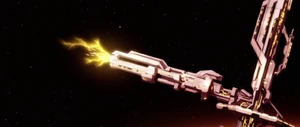
An Orbital Defense Platform above the planet Reach preparing to fire its Magnetic Accelerator Cannon.
The operation principle of a MAC is that of a coilgun.[Note 1] The cannon fires a massive metal projectile using a linear system of magnetic fields coils down a long shaft, increasing the projectile's velocity until it carries an incredible amount of kinetic energy. The weapons are as destructive as nuclear weapons without the risk of radiological contamination from ionizing radiation and fallout. Sheer kinetic hitting power is capable of destroying whole targets. The ship-based models use a depleted uranium core jacketed with a ferric lining to magnetically propel the round while orbital platforms and station-based versions use ferric tungsten rounds.
Mounting
The size of a Magnetic Accelerator Cannon is such that it is normally an integral component of a warship's superstructure. Some types of Defense Stations are literally built around the massive weapon for orbital defense.
Ammunition
A standard frigate-based MAC fires slugs of either ferric Tungsten or depleted Uranium measuring approximately 9.1 meters long at around 600,000 meters per second.[2] The high muzzle speed gives the 600-ton slug the kinetic energy and momentum necessary to damage a target and partially mitigates the unguided nature of the slug and its lack of maneuverability; once the round leaves the barrel it's trajectory essentially a straight line and cannot reorient it's direction. Orbital Defense Platforms fire a 3,000-ton slug at four-hundredths, or 4% of,[3] the speed of light, around 12,000 kilometers per second. Unlike explosive artillery rounds or missiles and energy weapons, the destructive force of the MAC round is via kinetic energy on impact.
Aiming
Because of their size, power and forces involved in firing; Magnetic Accelerator Cannons are built into the superstructure of a ship or weapons platform, requiring that it maneuver in order to aim the weapon. Since the projectile itself is also unguided, once the round is fired it's trajectory never will change. Shipboard versions generally require an AI to aim the cannon, as the projectiles are unguided and are extremely hard to aim by manual fire. Orbital platforms have dedicated targeting computers. However smaller MAC guns may exist as turrets which can be aimed regardless of ship position.
Firing
The firing process uses electromagnetism to fire a ferromagnetic-tungsten slug at high velocity. An extremely large current is put through the first Solenoid (coil of conducting wire). This creates a strong magnetic field which attracts the metal slug. As the slug passes into the solenoid, the solenoid is quickly turned off and the second solenoid, which is further up, is activated, this attracts the now high velocity metal slug just like the first solenoid. This process is repeated along the barrel of the cannon. By the time the slug is fired out the end of the barrel it has accelerated to a speed of approximately 30 kilometers per second for a ship-based MAC and around 12,000 kilometers per second for a "super" MAC.
For ODPs, a pair of thrusters on the bottom side of the station fire for a few seconds to counteract the inertia imparted to the station. It normally takes five seconds to recharge the capacitors as well as load the slug, which is why boarding craft are usually deployed to take the stations out.
Variants
Mark II, Light Coil
- Main article: Mark II, Light Coil
The standard frigate-mounted Mk. II MAC fires a 600-ton ferric-tungsten projectile with a depleted uranium core at 600 kilometers per second[2][4] The large amount of energy needed to fire the weapon is particularly onerous on a warship, and the extended recharge time is a significant factor in combat against Covenant warships as multiple MAC rounds are required to penetrate Covenant shields. At 1.08e17 Joules per shot (Ek = ½ × 600,000 kg × 600 km/s2), it has a standard destructive output of 25818.79 kilotons TNT-equivalent.
Shipborne MAC draw power from the ship's reactor and require a charge of the weapon's magnetic coils in order to be fired. According to Halo: the Fall of Reach it takes three shots from a standard MAC to effectively lower the shields of a Covenant ship and destroy it. The time it takes to bring the MAC's systems to full charge on a UNSC vessel is the deciding force in a conflict. Thus, while a vessel may not run out of ammunition for a long time (depending on the size/weight of the shots and the capacity of the ship), a captain or commander has to carefully analyze the situation of a battle and use his shots strategically. The weapon can be fired even when not at full charge, but the velocity of the projectile is greatly diminished.
Types
- 56A2S4 MAC - Used on the UNSC In Amber Clad,[5] and likely every Stalwart-class light frigate.
- 83B6R3 MAC - Used on the UNSC Forward Unto Dawn,[6] and likely every Charon-class light frigate.
Mark II "Modified MAC"
- Main article: 56A2D4 MAC
When the UNSC ship Pillar of Autumn was refitted for the war against the Covenant, it received the latest version of the ship-based MAC weaponry. Magnetic field recyclers coupled with booster capacitors allowed the light coil cannon to be fired three times per full charge, unlike traditional shipborne MAC systems, which could only fire once per charge. Pillar of Autumn also carried new lighter MAC rounds that had a less dense ferrous core, but a harder outer layer of tungsten carbide. Also, Pillar of Autumn's MAC charges up faster than normal UNSC MAC cannons, most likely due to Pillar of Autumn's advanced reactor(s).
Mark 2547 "Mini MAC"

The Mammoth's "mini mac" seen through the HUD of a Spartan
One of the smallest vehicular mounted MAC guns. This weapon is first seen on the UNSC Mammoth and fires a smaller round than the standard MAC gun. It uses the same technology as the standard-sized MAC, housed in a smaller frame for more power during siege operations. Despite its size it is capable of considerable hitting power; even capable of striking targets in orbit. In atmosphere it can completely obliterate a Phantom in a single shot. Shots from this MAC can even damage a Covenant battlecruiser.
Mark V "Super MAC"

The Moncton-class orbital weapon platform Cairo Station armed with a "Super" Magnetic Accelerator Cannon.
- Main article: 14D4A1 MAC
UNSC Orbital Defense Platforms typically mount larger and more powerful versions of the standard Magnetic Accelerator Cannon, nicknamed "super" MACs or "the big stick."
These cannons fire a 3000-ton ferric-tungsten round at 12,000 kilometers per second, or 4% of the speed of light.[3]
Against Covenant shield technology, the rounds possess enough kinetic energy to punch through shields, cut through the ship, and, upon exit, still retain enough energy to destroy a second ship, and cripple a third ship.
It is theorized that if a ship's armor or shields were to absorb all the kinetic energy of a super MAC round, the release of thermodynamic energy would still vaporize the ship. By receiving power from ground-based power plants, orbital platforms could achieve recharge and reload times as short as five seconds.
Series-8 "Super-Heavy MAC"
- Main article: CR-03, Series-8 MAC
Only seen on board UNSC Infinity, the CR-08 Series-8 is a 27 meter bore diameter MAC which fires an ultra-dense projectile at a fraction of the speed of light and is capable of creating terrestrial craters several miles wide. The shock-wave generated is powerful enough to knock in-atmosphere star ships out of the air. The gun can also fire several sub-caliber rounds, unmanned cargo packages. Its exo-atmospheric combat capabilities were shown when the UNSC Infinity managed to use the Series-8 to puncture the Mantle's Approach's hull.
Mark IV, Heavy Coil
The Post-war Strident-class heavy frigate utilized a Mark IV, Heavy Coil - 94B1E6 MAC.[7]
Mark IX, Heavy Coil
The Mark IX, Heavy Coil - 45J3D3 MAC was installed onboard Autumn-class heavy cruisers.[8]
Related Technologies
M68 Gauss Cannon
- Main article: M68 Gauss Cannon
The M68 Gauss Cannon is a UNSC weapon mounted on the M12G1 Light Anti-Armor Vehicle as well as on stationary turrets. It utilizes the same coilgun technology used in Magnetic Accelerator Cannons, but on a smaller scale.
M99 Stanchion Gauss Rifle
- Main article: Model 99 Special Application Scoped Rifle
The M99 is a man-portable anti-material and anti-personnel special application weapon. Like the M68 Gauss Cannon, it utilizes the same coilgun technology as a MAC, only on an even smaller scale, using 5.4mm/.21 caliber rounds. Though smaller than conventional ammunition, these rounds are accelerated to speeds fast enough to travel long distances with almost no change in trajectory, punch through any obstructing materials, hit their target, and still retain significant kinetic energy.
M92 Principle Gauss Cannon
- Main article: M92 Principle Gauss Cannon
The M92 Principle Gauss Cannon is a Magnetic Accelerator Weapon that runs along the length of the Open Frame 92/Extra-Vehicular Activity.
M555 Electromagnetic Launcher
- Main article: M555 Electromagnetic Launcher
| This section requires expansion. |
Mass drivers
- Main article: Mass driver
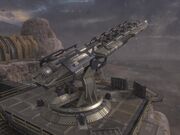
An Onager MAC on Reach in the Aszod ship breaking yards
The mass driver is a somewhat primitive United Nations Space Command orbital launch assembly designed to propel low-weight payloads into orbit, otherwise known as orbital lifting. The operating principle of the mass driver is essentially the same as that of the Magnetic Accelerator Cannon: it is a large coilgun that magnetically accelerates a package consisting of a magnetizable holder containing a payload.
While not a purpose-built weapon like the UNSC's Magnetic Accelerator Cannon, these platforms are still potent weapons of opportunity. While never formally incorporated as a weapon, mass drivers have been used at as defensive magnetic accelerator weapons at Harvest, the Rubble, Reach, Ivanoff Research Station and on UNSC Infinity. An Onager-class driver is capable of disabling a CCS-class battlecruiser, with its shielding down.
Gameplay

The MAC Blast in use.
MAC Blast
- “Use the Spirit of Fire's awesome Mass Accelerator Cannon to incinerate enemy troops.”— In-game description.In Halo Wars, the MAC Blast ability allows the player to use UNSC Spirit of Fire's MAC for pinpoint orbital bombardment. It is mainly used as a support weapon to help the UNSC penetrate heavy Covenant defenses and Covenant bases, and is a potent weapon against Scarabs.
In skirmish and multiplayer, the MAC Blast can only be used if Captain Cutter is selected as the player's leader. In the campaign, the MAC Blast is available in several missions, most notably Dome of Light, during which the player is granted access to forty rapid-fire MAC rounds to destroy a Covenant base, a feat that would be impossible outside of gameplay.
Trivia
- The Magnetic Accelerator Cannon is twice wrongly addressed in the Halo Universe - once as the "Mass Accelerator Cannon" in Halo: Contact Harvest, and as the "Mass Accelerated Cannon" in Halo Wars.
- The upgraded colony ship UNSC Spirit of Fire's MAC cannon is unable to penetrate a Covenant citadel's shield in Halo Wars with one round.
- The primary MAC on UNSC Infinity was capable of creating a crater several miles wide on Sanghelios.[9]
Gallery
Appearances
Notes
- ↑ A coilgun (not to be confused with a railgun) is a type of cannon which uses one or more electromagnetic coils to accelerate a magnetic projectile to high velocity.
Sources
- ↑ Halo: Contact Harvest, Page 119
- ↑ 2.0 2.1 Halo: The Fall of Reach, Page 108
- ↑ 3.0 3.1 Halo: The Fall of Reach, Page 283
- ↑ Halo: The Fall of Reach, Page 130
- ↑ Halo Waypoint: Universe - In Amber Clad
- ↑ Halo 4: The Essential Visual Guide, Page 186
- ↑ Halo 4: The Essential Visual Guide, Page 192
- ↑ Halo 4: The Essential Visual Guide, Page 192
- ↑ Halo: The Thursday War - page ??
External
- Halo.bungie.org: Overview of an Orbital Defense Platform by Stephen Loftus
- Wikipedia's article on Coilgun
| ||||||||||||||||||||||||||||||||||||||




